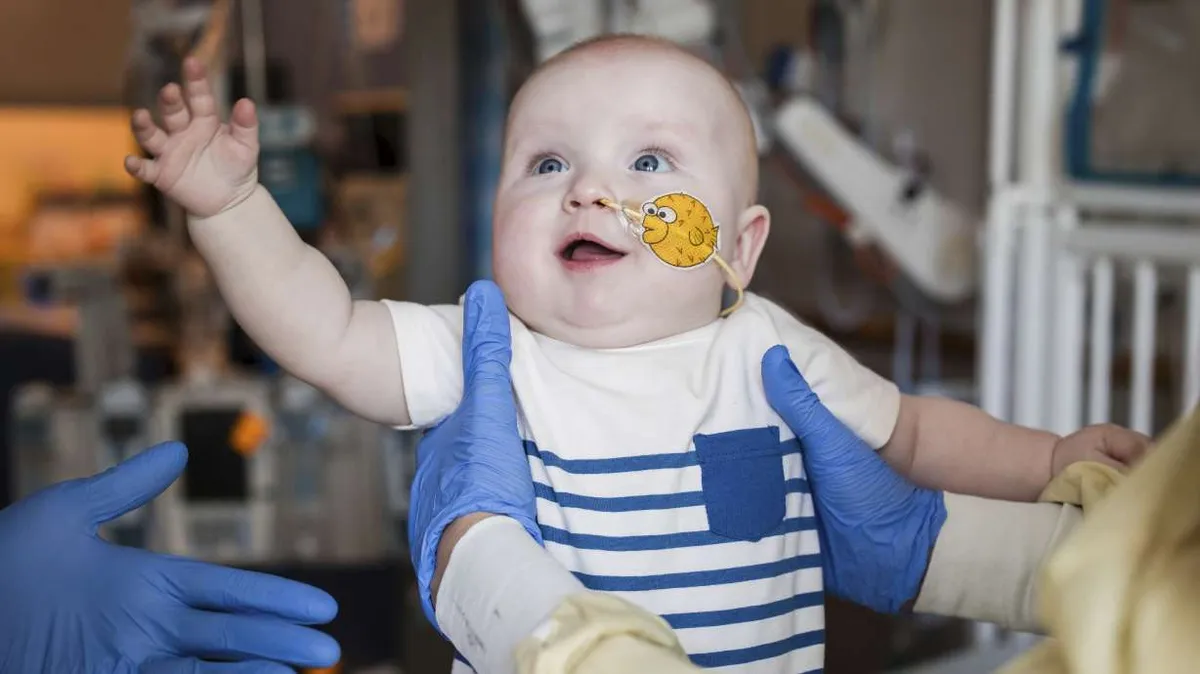
In a groundbreaking case from Philadelphia, a baby born with a rare and dangerous genetic disease is now growing and thriving thanks to an innovative and experimental gene editing treatment specifically designed for him. Researchers have detailed this remarkable case in a new study, highlighting that he is among the first patients to successfully receive a custom therapy aimed at correcting a critical error in his genetic code—a defect that leads to a grim prognosis for many affected infants.
While it may take time before similar personalized treatments become widely available, medical professionals are optimistic that this technology could eventually assist the millions of individuals left behind in the current landscape of genetic medicine. Dr. Kiran Musunuru, a gene editing expert at the University of Pennsylvania and co-author of the study published in the New England Journal of Medicine, emphasized that this case marks a significant milestone in the quest for gene editing therapies to address a variety of rare genetic disorders that currently lack effective medical solutions.
The baby at the center of this study, KJ Muldoon, hails from Clifton Heights, Pennsylvania, and is one of the estimated 350 million people worldwide suffering from rare diseases, the majority of which are genetic in nature. Shortly after birth, KJ was diagnosed with severe CPS1 deficiency, a condition that some experts estimate affects approximately 1 in every million infants. This genetic disorder prevents the body from producing an enzyme necessary to eliminate ammonia, leading to toxic build-up in the bloodstream.
Faced with KJ's dire prognosis, parents Kyle and Nicole Muldoon, both 34, grappled with the daunting decision between a risky liver transplant and an experimental treatment that had never been attempted before. "We were weighing all the options, asking all the questions," Nicole recalled. "We prayed, talked to people, and gathered information, eventually deciding this was the route we were going to take," her husband added.
In an impressive feat, the medical team at Children's Hospital of Philadelphia and Penn Medicine, in collaboration with their partners, developed a therapy specifically designed to correct KJ's faulty gene within just six months. Utilizing the revolutionary CRISPR gene editing tool, which earned its inventors a Nobel Prize in 2020, the researchers employed a technique known as base editing. This method flips the mutated DNA letter to its correct form, significantly reducing the risk of unintended genetic changes.
In February, KJ received his first intravenous infusion of the gene editing therapy, delivered using tiny lipid nanoparticles that are absorbed by liver cells. Despite the excitement in the room, KJ slept through the entire procedure, as noted by Dr. Rebecca Ahrens-Nicklas, a gene therapy expert involved in the study. After follow-up doses in March and April, KJ has shown remarkable improvement; he can now eat more normally and has recovered well from common illnesses, which previously posed a risk to his health.
At just 9 ½ months old, KJ now requires less medication, and his parents celebrate every milestone, no matter how small. "Considering his poor prognosis earlier, any time we see even the smallest milestone that he's meeting – like a little wave or rolling over – that's a big moment for us," said Nicole. However, researchers caution that this is just the beginning. "We're still very much in the early stages of understanding what this medication may have done for KJ," Ahrens-Nicklas explained. "But every day, he's showing us signs that he's growing and thriving."
Researchers are hopeful that the insights gained from KJ's treatment will pave the way for other patients suffering from rare diseases. Although gene therapies are typically expensive to develop, this study demonstrates that creating custom treatments can be feasible financially. Dr. Musunuru noted that the cost of KJ's therapy was comparable to the $800,000-plus required for an average liver transplant, suggesting that as technology advances, costs may decrease.
As the scientific community continues to refine these therapies and reduce development timelines, there is optimism that economies of scale will lower costs even further. Experts like Senthil Bhoopalan, a gene therapy researcher at St. Jude Children's Research Hospital, believe that this research lays a solid foundation for targeting other rare conditions. Neurology professor Carlos Moraes of the University of Miami echoed this sentiment, suggesting that the breakthroughs achieved in KJ's case could inspire rapid advancements across the field in the coming years.
The Associated Press Health and Science Department acknowledges support from the Howard Hughes Medical Institute's Science and Educational Media Group and the Robert Wood Johnson Foundation, while retaining sole responsibility for all content.